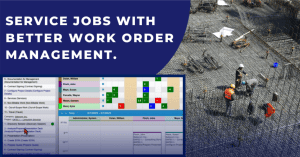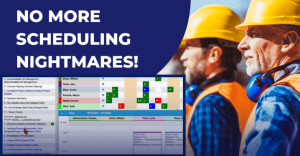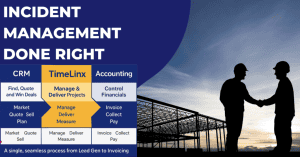By Mark Engelberg – TimeLinx
Intro
Agility is a buzzword that applies to every aspect of software and business operations. Companies must be agile in their approach to customers, project management, and budget flexibility. In today’s rapidly changing environment, flexibility and imagination are essential for running any part of your business. “He who does not bend will break” applies directly to business and project management. This principle is evident in industries like oil and gas or food and beverage manufacturing, where operational excellence, process safety management, and risk assessment require adaptability and speed.
A PSM (Project and Service Management) solution should reflect your company’s agility in planning and executing projects, managing staff and tasks, and tracking hours. It should support your growth, regardless of changing requirements. For example, an electrical contractor may start with residential clients, but a call from a commercial building owner introduces vastly different project needs. The contractor’s PSM software must adapt to these unexpected requirements. When purchasing a system, remember your business may face sudden changes in direction. You’ll need to integrate every aspect of a project, even as project types evolve. This includes assigning tasks, resources, and schedules to manage conflicts between deliverables. Lack of product flexibility disrupts your processes when you need stability most and can damage your reputation. In sectors like product development or environmental management, robust management software ensures quality and regulatory compliance, especially when safety risks are high.
Multiple Projects, Multiple Problems
Managing multiple projects inevitably brings multiple challenges. Balancing numerous elements without technological support is rarely sufficient. With many projects in progress—some short-term, some longer, some handled by individuals and others by teams—you must stay on top of everything. If your company employs multiple project managers overseeing large teams, your challenges multiply. A system that enables everyone to work consistently is crucial, rather than each PM developing their own workarounds for an ill-fitting solution. Harmony and consistency in project planning contribute to improved process safety, more effective change management, and better risk management across departments.
A small design change or correction of human error can lead to significant, unplanned changes in project scope, which may cascade into other ongoing projects for various customers. Unmanaged changes create a multiplier effect of unexpected issues. If your PSM software is flexible enough to integrate these issues, help assess situations accurately, and provide guidance on resource allocation, you’re already ahead. Your PSM tool should cover all areas of project management. If it’s only a task manager, it cannot advise on budget impacts. If schedules are affected, scheduling features are needed. If changes impact many people, automated notifications are essential—otherwise, you’ll be notifying everyone manually. If billing becomes complex and ERP integration is missing, problems will grow. Integrating these variables is vital for both traditional project and field service companies, as well as operations requiring process safety management or standing privileges for employees in diverse industries like food and beverage or oil and gas.
Man Plans and God Laughs
Anyone who has managed projects knows the frustration when yesterday’s plans become obsolete and the project scope changes. Teams scramble, ideas shift, and flexibility becomes critical. You may have to choose between sacrificing budget for time or vice versa. Issues in one project may affect others, requiring you to reallocate resources quickly. Larger organizations may need broader process safety or compliance reporting to anticipate consequences in regulated sectors. Consulting services can provide insights on structuring flexible staffing and managing risk effectively during these pivots.
Integration is essential. Your PSM solution must integrate all these elements and track their impact across live projects. Staying afloat during change is easier with the right tools. Don’t settle for a low-end tool thinking you’ll upgrade later. The busier you get and the faster your company grows, the harder it is to implement new software mid-growth. Your path to success doesn’t need to be one-dimensional or fixed. Those who adapt and still reach their goals grow stronger—both as individuals and organizations. This is especially true if you need advanced features like management of change (MOC), product structure management, or integration with cloud solutions that unify data across departments. In regulated environments, these integrations help maintain compliance at all times.
Multiple Industries
Not every company serves a single industry. Deliverables across projects may require different tasks, all of which must be recorded and tracked. If your PSM solution is inflexible and can only track certain task types—such as those on a fixed list that can’t be altered—you’ll quickly encounter problems. For example, a real estate management company may handle gated residential estates, commercial parks, entire communities, or golf courses, each with unique needs and deliverables. There’s little value in a project management system that cannot accommodate all your requirements. Tracking project needs becomes a nightmare if your staff must create workarounds due to software limitations. Choose the right solution from the start. A flexible PSM software that integrates with advanced product stewardship features or connects to business objects helps companies avoid logistical bottlenecks and prepares them for unexpected growth opportunities, even in global or large-scale environmental management sectors.
Conclusion
Flexibility is essential for survival in today’s corporate world. Addressing changes and issues before they become major problems, while minimizing unnecessary resource consumption, is key. The ability to record and track data across multiple projects and customer types is a necessity. You may not think your business needs a comprehensive PSM solution today, but when the need arises, you’ll wish you had it. Integration should encompass all the features you might require, ideally in as few software solutions as possible. While integration across multiple products is sometimes possible, a fully integrated solution saves time, money and reduces headaches well into the future.
Consider how your PSM solution accommodates management principles, whether for streamlining risk management or ensuring process safety compliance. Even specialized scenarios like food and beverage manufacturing or product stewardship supplier relationships benefit from comprehensive software that merges flexible staffing, management change facilitation, and robust product structure insights. Focusing on operational efficiency and cost savings leverages the power of a truly agile PSM system. By carefully evaluating solutions that manage wide-ranging tasks—like change MOC, reusable business libraries, or complex product structures—and uniting them under one cohesive system, organizations build a resilient foundation for ongoing growth, effective risk assessment, and operational excellence.




